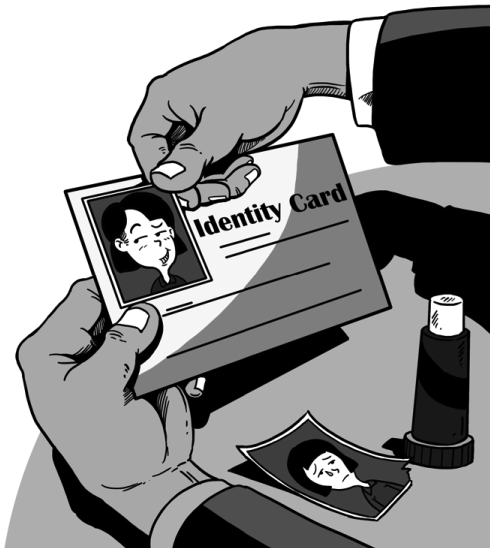
Wang Nana was dumbfounded when a bank clerk told her that she had not been honest in her application for a bank loan. According to a credit check, the 33-year-old graduated from Zhoukou Vocational and Technical College in 2006 and runs a photocopy outlet in Central China's Henan province.
But Wang never went to a college.
An investigation revealed a carefully planned crime committed 13 years ago. Wang had taken the national college entrance exam in 2003, but she didn't receive an admission letter from any university. Giving up her college dream, Wang then shifted to another city to work.
The truth, however, is that her college enrollment letter was intercepted by another girl, who attended college under her name. Zhang Yingying, the impostor, graduated with a certificate that carries her photo but Wang's name and ID number. Zhang later landed a job as a teacher at a vocational school.
More details emerged as the probe continued. Zhang Yingying's father confessed that he had bribed the teacher in charge of mailing the enrollment letters to get Wang's admission letter. He then got a fake ID card and hukou (or household registration) for his daughter by bribing local police officers.
For girls (and boys) from poor rural families like Wang, a college degree can change their lives. This makes the act of denying her the life-changing opportunity a crime.
But Wang's is not an isolated case.
In another case that came to light recently, Liu Hongli, a teacher also from Henan, found that her hukou had been "transferred" to Beijing and her Henan household registration nullified, which essentially meant she didn't exist. That was 11 years ago.
Further inquiry revealed the details. In 2004, a colleague of Liu borrowed her university certificate as she sought her help to apply for a job for Cheng Yuanyuan-the latter being the colleague's friend. Instead, Cheng used Liu's certificate to land a job in Beijing and then got Liu's hukou "transferred" to the capital. After the case was cracked, Cheng's Beijing residence permit was revoked and Liu's reinstated.
Both cases point to poor management and loopholes in the household registration system. In China, hukou, a small piece of paper, is a lot more than just proof of residence.
There is a huge difference between a rural and an urban residence permit. Even if a person spends his/her entire life working in a big city, but doesn't have a permit to live permanently in the city, he/she can only get pension after retirement in the place where his/her household is registered.
Having one's household registered in a city like Beijing brings with it lots of social benefits in terms of education, welfare and insurance, which drive people to fabricate or even steal others' identities.
Separating hukou from the social benefits is a difficult part of the reform. For a vast country with a huge floating population like China, it is difficult to prevent duplicated ID numbers or inconsistency between ID and residence permit.
Incidents of a person being wrongfully detained by police for having an ID number that matches that of a criminal suspect or a man seeking to register his first marriage being told that he is already married have been reported from time to time.
But in Wang's case, the horrible fact is that Zhang Yingying's father bribed officials to give his daughter a fake identity. Had Wang's school, the college she was supposed to attend or the police followed the rules, the tragedy would have been prevented.
Zhoukou authorities announced recently that 13 people involved in the case had been punished and three of them face criminal charges. But irrespective of the outcome of the court case, Wang cannot get her lost 13 years back.
So the culprits should get the harshest punishment, in order to deter potential cheats in the future.
The writer is an editor with China Daily. [email protected]

I’ve lived in China for quite a considerable time including my graduate school years, travelled and worked in a few cities and still choose my destination taking into consideration the density of smog or PM2.5 particulate matter in the region.